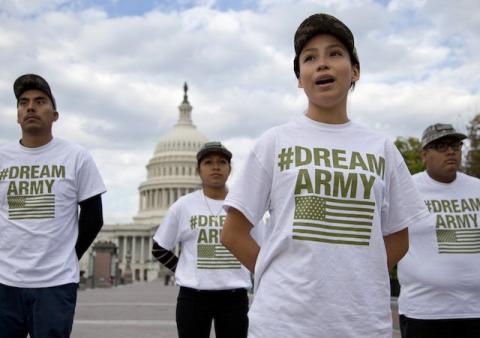Since President Trump announced the possible end of the Deferred Action for Childhood Arrivals (DACA) program, it’s left those so-called “DREAMers” currently serving in the military under a special program wondering what would happen to them.
And the answer is, no one knows.
What complicates the situation is that those with a DACA immigration status can’t simply enlist in the military like natural born citizens. They must be eligible for a program called Military Accessions Vital to the National Interest (MAVNI), which recruits those with specific vital skills, such as doctors or nurses or those that speak specific languages.
Spanish is not one of those languages (most DREAMers come from Spanish-speaking countries); however Russian, Chinese, and Arabic are among the languages sought.
In exchange for their service, MAVNI participants are afforded an expedited path to citizenship, but expedited doesn’t mean immediate. The process still takes time and there are conditions of service that must be met in order to qualify.
The MAVNI program is still active, but has stopped accepting applicants due to security concerns and currently there are about 10,000 total members recruited through the MAVNI program since it began in 2009, but only a small number would be affected by the end of DACA.
In July, it was announced that after a year-long investigation, serious security problems were found, including concerns of foreign infiltration and enrollees in the program who are now unaccounted for.
As of yet, there is no evidence to suggest that the military has been infiltrated by any known terrorist organization, but the investigation showed that the potential did exist.
“ISIS has always had desire to use migration as way to penetrate into countries,” said retired U.S. Army General Jack Keane, a military analyst for Fox News.
“They have done that successfully in Europe because of open borders, mass immigration with no vetting. In the U.S., we haven't had any record of their penetration. And certainly if this program is compromised and there's a possibility of that kind of penetration, it's got to be thoroughly investigated.”
Advocates of the program are quick to point out that the entire program is not a disaster, and point to Sgt. Saral Shrestha, originally of Nepal who was the Army’s Soldier of the Year in 2012, as well as data that shows that MAVNI recruits routinely out perform non-MAVNI recruits in critical areas, according to independent analyses.
The potential end of DACA poses the question of what would happen to those who enlisted under MAVNI in a DACA status.
If Congress doesn't pass a DACA bill, these people could potentially be deported. At the very least, they would no longer be eligible to serve and would be kicked out of the military under current laws and DOD rules.
And that doesn’t sit well with some.
“Anyone who is willing to take a bullet for this country, anyone who is willing to serve in uniform, should at the end of their military service be given an opportunity to become an American citizen,” said Missouri Gov. Eric Greitens, a Republican and former Navy SEAL.
The President himself said he supports a path to citizenship for those who serve during a Presidential Candidates forum in September of 2016.
“I think when you serve in the armed forces, that’s a very special situation and I could see myself working that out, absolutely,” Trump replied.
So what happens to those few who fall into this category? Well no one really knows.
"We're still figuring out what the different outcomes are," said Dave Lapan, spokesman for the Department of Homeland Security. He said in an interview with USA Today that his department and the DOD were working together to figure out a solution.
For now, there are more questions than answers. What type of discharge would they receive; honorable, other than honorable or administrative? Would they still be afforded an expedited path to citizenship under another immigration classification or would they be immediately deported?
Ultimately the answer to those questions and more will have to come from Congress in the coming months.
Currently there are about 900 DREAMers in total serving in the military, just over .001% of the total military population.
Photo Source: AP
